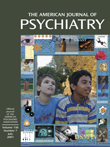Five-Year Clinical Course Associated With DSM-IV Alcohol Abuse or Dependence in a Large Group of Men and Women
Abstract
OBJECTIVE: The prognostic validity of the DSM-IV diagnoses of alcohol abuse and alcohol dependence was evaluated by examining the 5-year clinical course associated with those diagnoses in a large group of predominantly blue-collar men and women. METHOD: Personal semistructured interviews were carried out 5 years after an initial evaluation with 1,346 (75%) of the approximately 1,800 men and women participating in the Collaborative Study on the Genetics of Alcoholism who were eligible for follow-up. RESULTS: About two-thirds of the 298 subjects with DSM-IV alcohol dependence at baseline maintained that diagnosis during the 5-year study period. Fifty-five percent of the 288 subjects with DSM-IV alcohol abuse at baseline continued to meet one or more of the 11 DSM-IV abuse/dependence criteria, and 3.5% went on to meet the criteria for dependence at follow-up. Among the 760 subjects with no alcohol diagnosis at baseline, 2.5% met the criteria for alcohol dependence and 12.8% for alcohol abuse at follow-up. Baseline characteristics that predicted the occurrence of any of the 11 DSM-IV abuse/dependence criteria during the 5-year interval included male gender, lack of marital stability, presence of several of the criteria for dependence, and history of illicit drug use. CONCLUSIONS: The data suggest that over 5 years the DSM-IV diagnosis of alcohol dependence predicts a chronic disorder with a relatively severe course, while DSM-IV alcohol abuse predicts a less persistent, milder disorder that does not usually progress to dependence.



